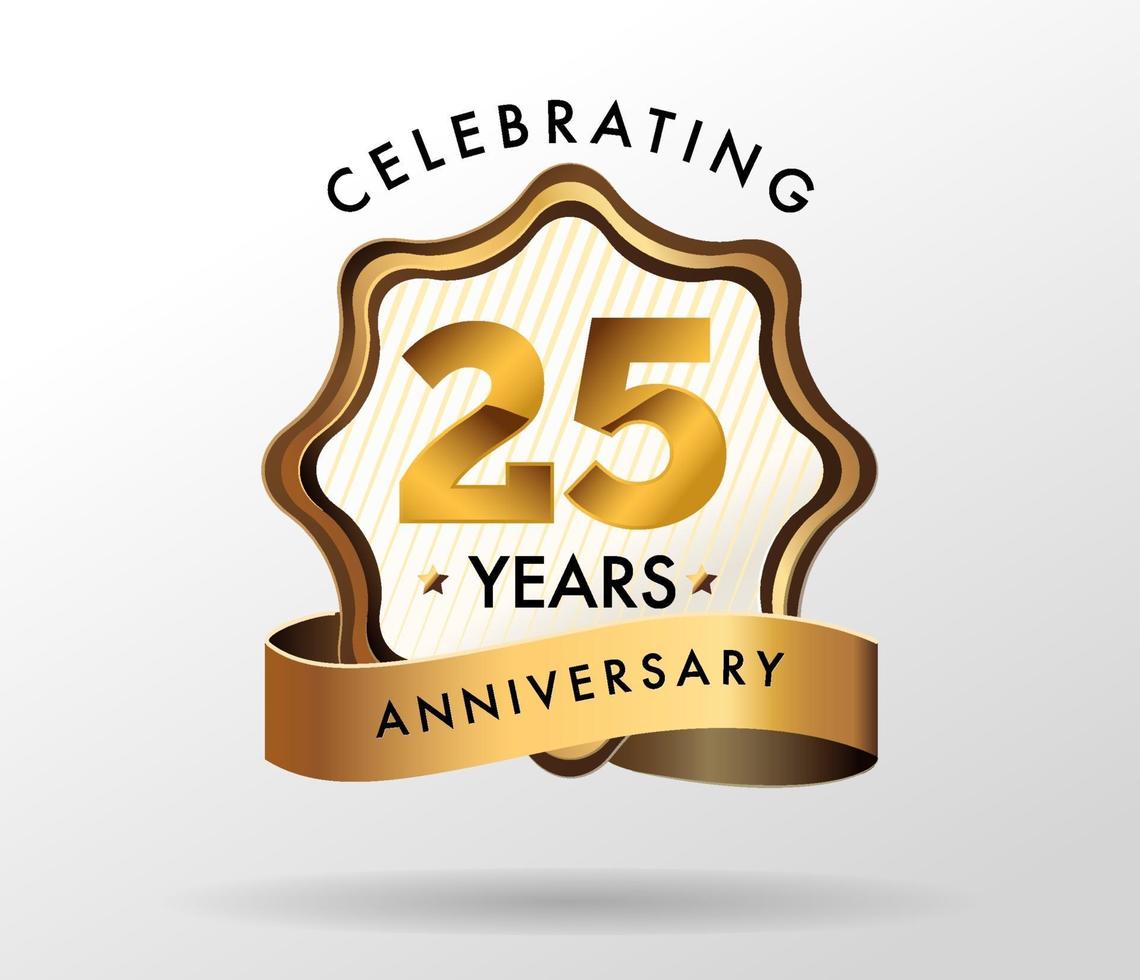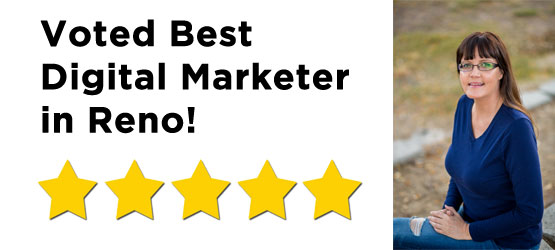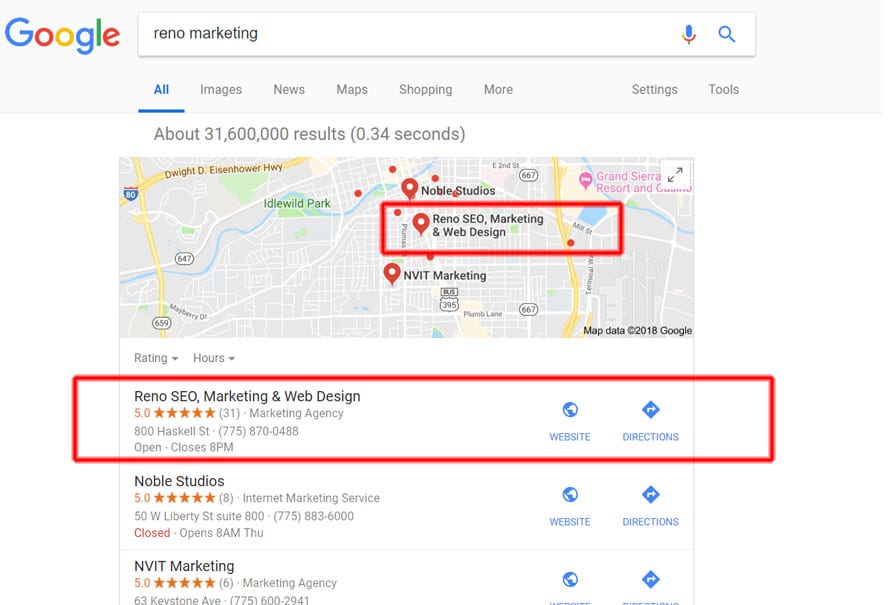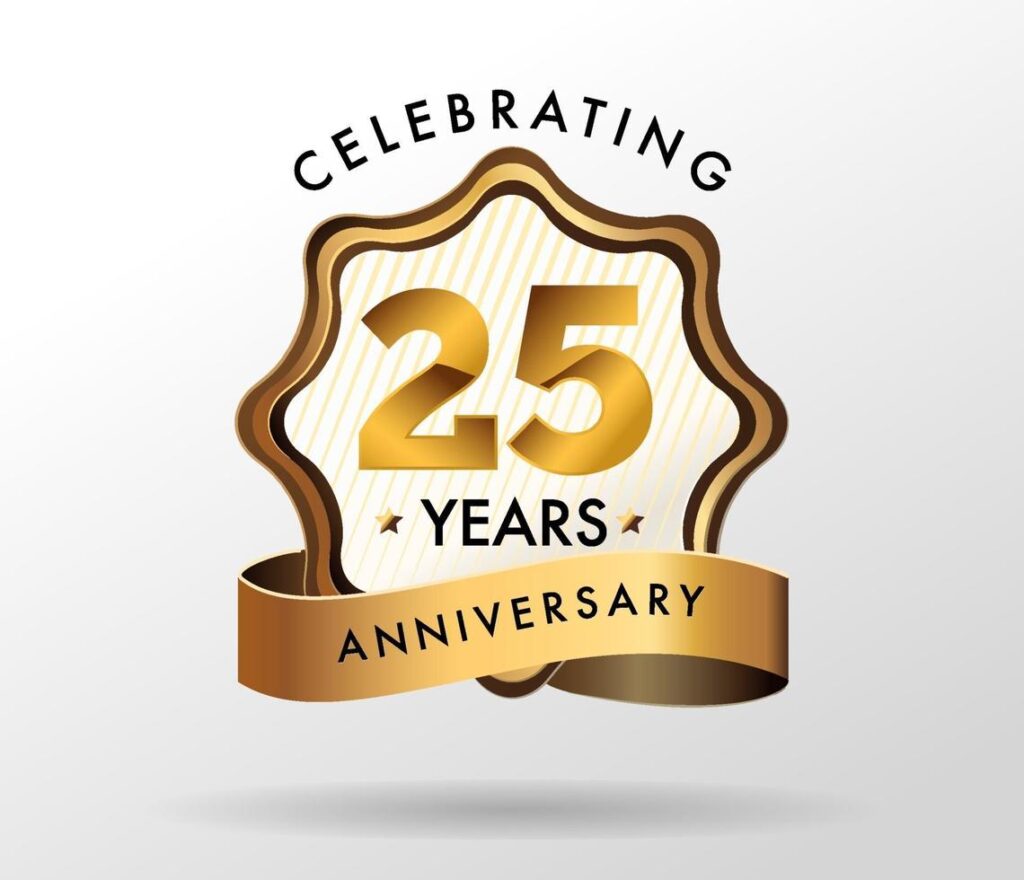What is SEO and how does it work?
SEO is an acronym for Search Engine Optimization, which is a process that uses certain tools and approaches to optimize the design, structure, content and popularity of a website. The objective of SEO is to attract higher amounts of high-quality traffic to the website.
The most successful websites are those that rank high when people search for products or services in the websites’ niche. SEO works by enhancing the popularity and visibility of a website, both to human visitors and search engine algorithms, so that the website features higher up than its competitors, in searches, on Search Engine Results Pages (SERPS).
In a highly competitive niche, a web search can sometimes deliver thousands of results, spread over scores of SERP. SEO works by prioritizing well optimized web pages, and displaying them earlier on – within the top-3 or top-10 results of page 1. Less optimized pages have less visibility, because they might appear on page 5 or 15, where typical consumers might never venture.
In the above SERP for the query “snow blowers for sale in New York”, SEO works by ranking the best optimized website at the top of the list of results, followed by sites with comparatively less optimized sites. Sites with poor or no SEO follow at the rear.

How do you do SEO?
Because search engine’s like Google constantly evolve their SEO algorithm methodologies, SEO is a relative activity. It depends on what you are optimizing the site for. For example, if a search engine’s algorithm looks for English content with perfect grammar and no spelling mistakes, to rank such sites high up in their SERPs, then one task in “doing SEO” must include fixing the grammar, spelling, punctuations and tenses of all content hosted on the website.
SEO is not about one single thing. In fact, “doing SEO” involves several factors, including:
- The quality of content on each page of the site. Higher quality means better SEO ranking
- On-Page SEO: This includes actions such as using appropriate and highly popular, keywords within page content; inviting other popular websites to link to your site, and making use of keywords in your title tags, meta descriptions and H1
- Effective Keywords: The use of highly relevant keywords
- Mobile-Friendliness: Use of responsive page design so the page loads on small-footprint and mobile devices
- Useful Backlinks: Linking to credible and high-authority websites
- BOT-friendly: Using site design techniques that make it easy for search algorithms to crawl through, index and rank the site
- Speed: Building pages that load faster, and having content that refreshes with minimal delay
- User Engagement: Having websites that are easy to navigate and user-friendly
Other SEO tactics include promoting the site via guest posts and through social media posts. The use of URLs too, make an impact on SEO. For instance, using URLs with specific (and popular) keywords, having related descriptive URLs, and using secure URL protocols (“https” instead of “http”) also help when doing SEO properly.
What do you mean by SEO?
The acronym “SEO” stands for Search Engine Optimization, and it refers to a process of optimizing a website to attract un-paid (or organic) traffic from web queries. When people want something off the web – for instance some information about an event, or a product or service they wish to purchase – they’ll typically search for it on the web. This process starts by keying-in a search term or a search word. For example, this might be:
- “COVID-19”; or
- “COVID-19 travel restrictions in New York”
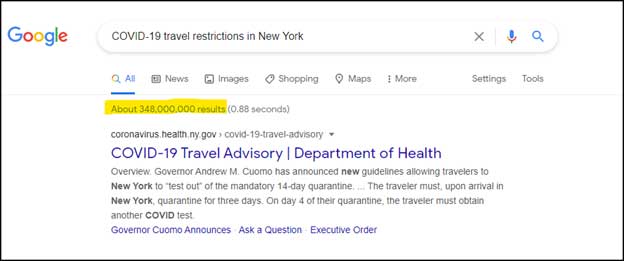
This is a web search query. The web browsers’ search engine (such as Google, Yahoo or Microsoft Edge) takes that query, and uses an algorithm to look for web pages that are a best fit to answer that query, and displays the most appropriate ones in the browsers’ search engine result pages (SERPs). So, the question is: If there are 500-million web pages that can answer the query, are all listed on SERPs?
The answer is: Maybe! However, the algorithm will only look for the most appropriate web sites to display in its SERPs. SEO is a set of strategies and tactics that website owners and online marketers use to ensure their site is one of those displayed higher-up on the SERP.
In the sample screenshot above, there may be several hundred million webpages that address the question “COCID-19 travel restrictions in New York”. However, Google only brings back 348-million results from pages optimized for Google’s search engine. If your browser is configured to display 50-results at a time, you may (hypothetically) have nearly 7-million pages of results to sift through. However, SEO ensures that the most optimized results appear in the top 5 or 10 on page 1.
What is an SEO example?
Browsers display web query results in two segments: Paid and unpaid (or organic). Search Engine Optimization (SEO) is a technique that helps website owners and online marketers display their websites higher up on organic website searches than their competitors. Because most consumers only act on web search results from the first few pages of a query, having the best optimized websites appear ahead of lesser-optimized websites makes it more likely for better optimized sites to get more organic (or unpaid) traffic.
A good example of the use of SEO is illustrated in the screen shot below.
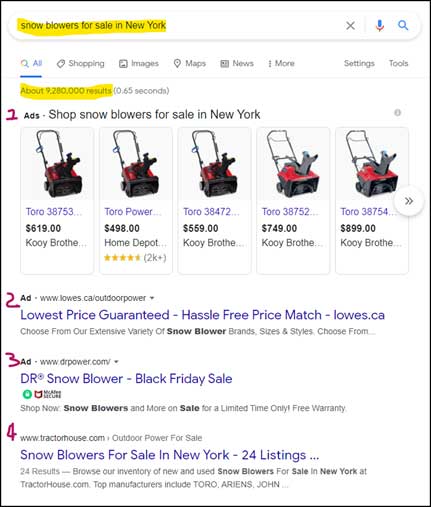
The searcher queries Google for “snow blowers for sale in New York”. Google determined that there are 9.28 million webpages that meet the criteria for the query. Of these, the top three results are paid advertisers. These rank high regardless of whether they meet specific SEO criteria – money talks! For most other websites – 9.279 million of them in the above example – SEO matters.
Why? Because only the most well-optimized websites feature high in the search engine results page (SERPs) for the above sample query. In the example above, the website listed as #4 will likely receive more traffic than those appearing below it. Additionally, because of how consumers interact with the SERP listings – they only typically view the first 4 or 5 pages before clicking on a link to buy – a webpage listed high-up on page 1 (as opposed to featured on page 2 or 200!) will receive more organic traffic than those featured as number 20 on page 1 or (ranked 1 on page 2). And that’s just yet another example of SEO done well!
What are SEO tools?
Like any project – for instance a home improvement task – having a good set of tools makes all the difference to how well website owners do SEO. The tools not only help with implementing a good SEO strategy, but, once in place, some tools help monitor the effectiveness and efficiency of the strategy.
Here are three great SEO tools to consider:
- Google PageSpeed Insights: This is Google’s tool that analyzes the speed of a webpage and then offers recommendations on page speed and how to better improve it.
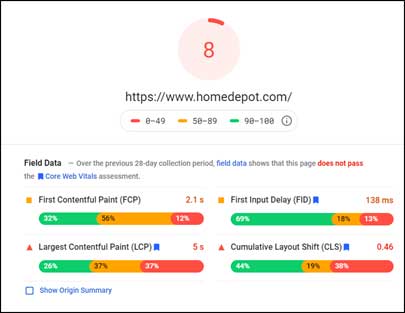
- Google Analytics: This is another one of Google’s tools that helps website owners make useful decisions regarding their SEO strategy. It uses machine learning capabilities to extract data about your webpage, your site, visitors to your site and your competitors. The data is then presented in helpful analytical reports and graphs to aid in prioritizing SEO responses.
- Bing Webmaster Tools: This is a Microsoft tool that allows website owners to perform SEO analysis on their websites. The tool helps you optimize your web pages so you rank better on the Microsoft Bing search engine.
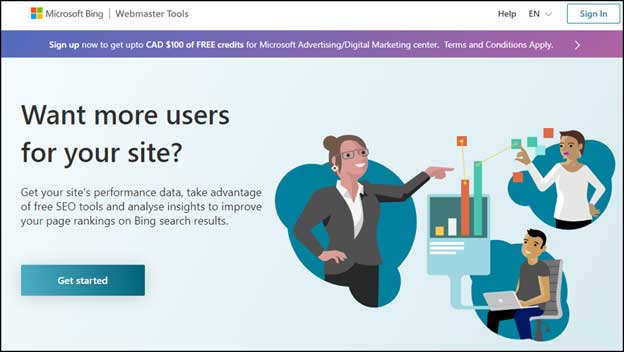
- Ahrefs Backlink Checker: Backlinks are one element, albeit a very important one, of SEO that all search engines consider when ranking a webpage on their SERPs. This tool analyzes a website and provides invaluable feedback on backlinks, and offers statistics on the Referencing pages’ Domain Rating (DR), URL Rating (UR), the number of links to your site from that page and the monthly organic traffic of that referring page. This data is invaluable to building your own SEO strategy.
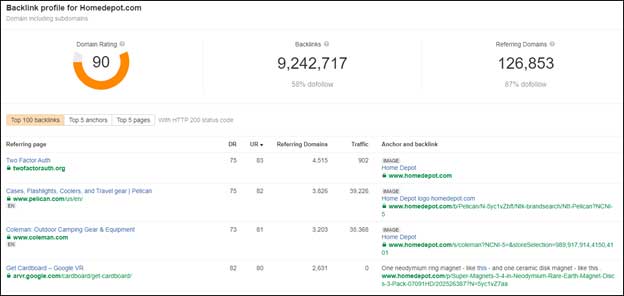
How many types of SEO are there?
There are various ways that website owners and webmasters may opt to do SEO. Some of the more popular types of SEO include:
- On-Page SEO: This type of SEO deals with features that optimize the page, it’s structure and its content to make it SEO-friendly
- Off-Page SEO: This type of SEO focuses on promoting the page/website on external sources (other websites, social media, directory listings)
- Technical SEO: This type of SEO focuses on optimizing the technical parameters of a website that impact a search engine’s ability to optimize and rank the page/site
- Content SEO: As a sub-set of an on-Page optimization strategy, this SEO tactic concentrates on optimizing site and page using high-quality content
- Local SEO: Local SEO is best used to promote a business within a local community or physical distance
- Mobile SEO: This SEO focuses on optimizing websites for mobile devices
- eCommerce SEO: Online marketers take advantage of eCommerce SEO to popularize their websites on search engines
Not all types of SEO are, however, applicable to every website. For instance, if your website only provides information to your visitors, and does not market or sell any product or service, then there’s no value in doing eCommerce SEO.

